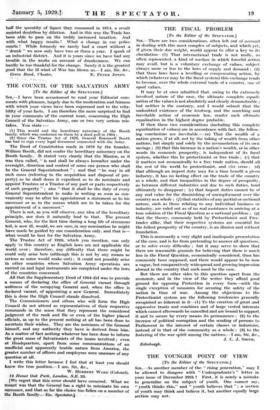THE COUNCIL OF THE SALVATION ARMY
[To the Editor of the SPEcrxroa.]
have been accustomed to read your Editorial com- ments with pleasure, largely due to the moderation and fairness with which your views have been expressed and to the relia- bility of your facts. I am therefore the more surprised to find in your cohiments of the current issue, concerning the High Council of the Salvation Army, one or two very serious mis- takes. You state (1) This would end the hereditary autocracy of the Booth family, which was conferred on them by a deed poll in 1904 ; (2) Since the Trustee Act of. 1926, General Bramwell Booth has had to sign every legal document connected with the Army.
The Deed of Constitution made in 1878 by the founder, William Booth, did not confer the hereditary autocracy on the Booth family. It stated very clearly that the Mission, as it was then called, " is and shall be always hereafter under the oversight, direbtion and control of some one person who shall be the General Superintendent " ; and that " he may in all such cases (referring to the acquisition and disposal of pro- perty) as he shall deem it expedient so to do nominate and appoint Trustees or a Trustee of any part or parts respectively of such property " ; also " that it shall be the duty of every General Superintendent to make in writing as soon as con- veniently may be after his appointment a statement as to his successor or as to the means which are to be taken for the appointment of a successor."
There is not, as you will observe, any idea of the hereditary principle, nor does it naturally lead to that. The present General, who, for the first time during a long life of strenuous toil, is now ill, would, we are sure, in any nomination he might have made be guided by one consideration only, and that is— what would be best for the Salvation Army.
The Trustee Act of 1926, which you mention, can only
apply to this country as English laws are not applicable the World over ; therefore, any difficulty that there might be
could only arise here (although this is not by any means as serious as some would make out) ; it could not possibly arise in other countries where Salvation Army operations are carried on and legal instruments are completed under the laws of the countries concerned.
All that the Supplementary Deed of 1904 did was to provide a means of declaring the office of General vacant through unfitness of the occupying General and, when the office is declared vacant, of appointing a new General. Immediately this is done the High Council stands dissolved.
The Commissioners and others who will form the High Council do not attend as representatives of their respective commands in the sense that they represent the considered judgment of the rank and file or even of the higher placed officials, as up to the present nothing at all has been done to ascertain their wishes. They are the nominees of the General himself, and any authority they have is derived from him.
As a matter of fact nothing whatever has been done to inform the great mass of Salvationists of the issues involved ; even at Headquarters, apart from some communications of an unofficial and apparently hostile nature from America, the greater number of officers and employees were unaware of any question at all.
I write this letter because I feel that at least you should know the true position.—I am, Sir, &c.,
W. HERBERT WARD (Colonel).
12 Honor Oak Park, London, S.E. 28.
[We regret that this error should have occurred. What we meant was that the General has a right to nominate his own successor, and that so far the choice has fallen on a member of the Booth family.—ED. Spectator.] • • -






































 Previous page
Previous page